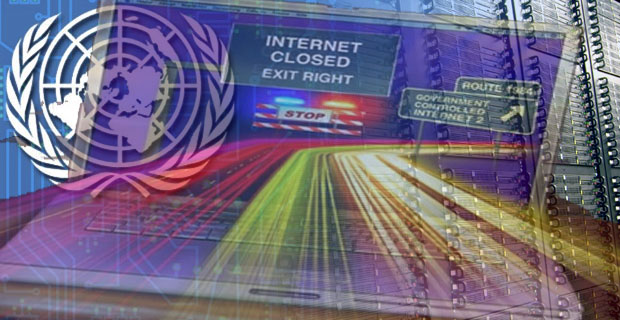The United Nations may be useful as a forum for world leaders, but it is not a productive place to develop policy. The international bureaucracy compulsively supports statist initiatives that would reduce individual liberty and expand the burden of government.
- Global taxation with no democratic accountability or oversight.
- A “right” to taxpayer-financed birth control.
- An international scheme to undermine the right to keep and bear arms.
- A Law-of-the-Sea Treaty that would give international bureaucrats tax and regulatory powers over international waters.
And you won’t be surprised to learn that the United Nations also wants to control the Internet. Actually, to be more specific, some nations want to regulate and censor the Internet and they are using the United Nations as a venue.
Writing for the Wall Street Journal, Gordon Crovitz explains this new threat. He starts by describing the laissez-faire system that currently exists and identifies the governments pushing for bad policy.
Who runs the Internet? For now, the answer remains no one, or at least no government, which explains the Web’s success as a new technology. But as of next week, unless the U.S. gets serious, the answer could be the United Nations. Many of the U.N.’s 193 member states oppose the open, uncontrolled nature of the Internet. Its interconnected global networks ignore national boundaries, making it hard for governments to censor or tax. And so, to send the freewheeling digital world back to the state control of the analog era, China, Russia, Iran and Arab countries are trying to hijack a U.N. agency that has nothing to do with the Internet. For more than a year, these countries have lobbied an agency called the International Telecommunications Union to take over the rules and workings of the Internet.
He then warns about the risk of government control.
Recommended
Having the Internet rewired by bureaucrats would be like handing a Stradivarius to a gorilla. The Internet is made up of 40,000 networks that interconnect among 425,000 global routes, cheaply and efficiently delivering messages and other digital content among more than two billion people around the world, with some 500,000 new users a day. …The self-regulating Internet means no one has to ask for permission to launch a website, and no government can tell network operators how to do their jobs. The arrangement has made the Internet a rare place of permissionless innovation.
Crovitz identifies some of the specific tax and regulatory threats.
Proposals for the new ITU treaty run to more than 200 pages. One idea is to apply the ITU’s long-distance telephone rules to the Internet by creating a “sender-party-pays” rule. International phone calls include a fee from the originating country to the local phone company at the receiving end. Under a sender-pays approach, U.S.-based websites would pay a local network for each visitor from overseas, effectively taxing firms such as Google and Facebook. …Regimes such as Russia and Iran also want an ITU rule letting them monitor Internet traffic routed through or to their countries, allowing them to eavesdrop or block access.
And he warns that the Obama Administration’s representative seems inadequately committed to advancing and protecting American interests.
The State Department’s top delegate to the Dubai conference, Terry Kramer, has pledged that the U.S. won’t let the ITU expand its authority to the Internet. But he hedged his warning in a recent presentation in Washington: “We don’t want to come across like we’re preaching to others.” To the contrary, the top job for the U.S. delegation at the ITU conference is to preach the virtues of the open Internet as forcefully as possible. Billions of online users are counting on America to make sure that their Internet is never handed over to authoritarian governments or to the U.N.
With all the support Obama got from Silicon Valley and the high-tech crowd, one would think this is an issue where the Administration would do the right thing. And it sounds like the U.S. is on the right side, but the real issue is whether the American representative is prepared to tell the dictators and kleptocrats to jump in a lake.
The moral of the story is that the United Nations should not be a policy forum. The bureaucrats seem to have no appreciation or understanding of how the economy works, perhaps because they live in a bubble and get tax-free salaries.
And I don’t say that out of animosity. The folks I’ve met from the United Nations have all been pleasant and I even participated in a U.N. conference as the token free-market supporter.
But just because someone’s nice, that doesn’t mean that they should have any power over my life or your life. And many of the nations pushing to control and regulate the Internet are governed by people who are neither nice nor pleasant.
P.S. You probably don’t want to know my innermost fantasies, but one of them involved the United Nations.



